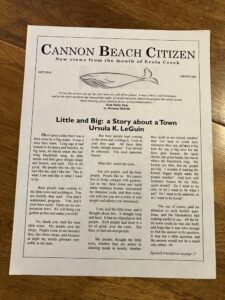
Cannon Beach friends continue to reel from the defacement of a beloved artist’s work. A promoter of three municipal projects appropriated a story that was gifted to us by Ursula K. Le Guin. Their rewrite triggers an old grief over the loss of place.
Boosters of urban growth call this a “parody,” though “trollery” is a better term. The rewrite erases any mention of the influence of money on our town. It alleges that resistance to urbanization is the cause of imbalance in the world. Over-development isn’t a factor, according to the troll. People could live in harmony with nature if we’d just drop angry calls to improve current practices, put our full trust in officials to cull the herds.
Le Guin’s writing has inspired me to question authority ever since my classmates and I read her work in school. I cannot find words to sufficiently describe what her art has done for me. Truth is I could barely speak when we first met in person. She walked through the scruffy back entrance of Jupiter’s Books, and there we were, just the two of us on a quiet day in paradise. What transpired was something akin to a “we’re not worthy” scene from Wayne’s World.
Thank goodness Ursula’s response to fans bore no resemblance to that movie. Over time we became friends. So my wife Jennifer and I were able to thank her with ease when she gifted Cannon Beach with her story “Little and Big: a story of a town” at a local reading of her work in 2002.
Several months later I asked her permission to publish the story in a newsletter we called the “Cannon Beach Citizen,” which predated another paper of the same name. We printed it in español too, as a righteous shout out to the Cannon Beach Gazette. The Gazette’s owner at that time refused to print emergency notifications that could be read by Spanish-speaking residents.

Context is important with stories. When Ursula wrote “Little and Big” there was a lot of concern about the displacement of cottages and greenspace by the spread of oversized homes, often called McMansions. Regulation of floor area ratio was a pivot point in the local timeline of urban growth. Jennifer and I thought we’d been part of a victory, having submitted a letter to the Cannon Beach Planning Commission. Apparently, Ursula’s story also made it into the public record, and the Commission decided to support strong standards that limit the size of homes.
Our feeling of accomplishment was short-lived, alas. Pro-growth forces overturned the Commission’s decision when it was appealed to the city council. I remember approaching Ursula and her husband Charles after that public meeting. Amid our shared sadness I apologized for misspelling her last name in our newsletter (I didn’t put a space between “Le” and “Guin”). She cheered me up by saying “just as long as you don’t call us Legumes.”
Since then the urban squeeze has continued apace in Cannon Beach, even as life has become less affordable for residents and visitors. Our village by the sea sports a familiar pattern of development accompanied by expanded scale, overcrowding, growing bureaucracy, and depletion of natural resources.
Three proposed capital projects place us at another tipping point. As I write these words citizens wonder if leaders will overturn a decision made by the Design Review Board on the first of these projects to be evaluated. Will boosters of growth defeat resistance again, now as they did twenty years ago? Will the spread of McMansions be coupled with the construction of biggie-sized municipal buildings?
Many of us will join Ursula in death over the next two decades. Unless leaders change course the Design Review Board will be gone, along with the reason for its existence. Jupiter’s Books will be replaced by some chain commercial franchise, if civilization survives our habituated behavior. Every day that seems like a bigger and bigger if, given the society we’re unmaking.
The word “world-building” is often used to describe Ursula’s work. Over the years we built a friendship on the exchange of written words, what anthropologists like her parents have called a “gift economy.” The last time we spoke I told her the great gift of her writing overwhelms me. I said it fills me full of yearning to contribute something that makes a big difference.
“Just give a little bit at a time,” she advised, which is encouraging when one considers the collective potential of creativity.
Keep giving, fellow artists, regardless of what happens today or tomorrow. Every one of us participates in the unfolding story of a timeless magic we can barely imagine.
Thank you for the excellent piece and for fighting for our way of life.
Thanks for deciding to write this concisely cogent & relevant essay,”Exchanging gifts with Ursula,” and sharing it on Upper Left Edge. Something I admire is your knack for tucking expansive phrases into your texts, e.g, “righteous shout out,” “every one of us participates in the unfolding story …,” etc.
Here’s a piece I wrote about Ursula a while back, published in an online Canadian journal. https://www.vancouverobserver.com/blogs/bedsidetable/2010/06/21/heading-home-author-ursula-k-le-guin.html